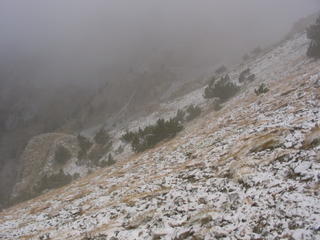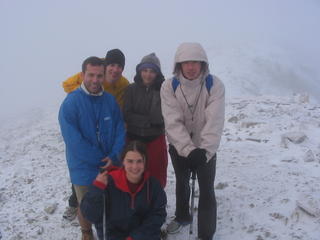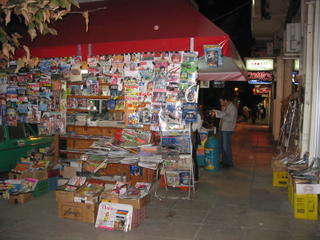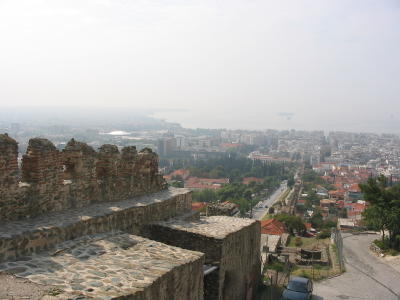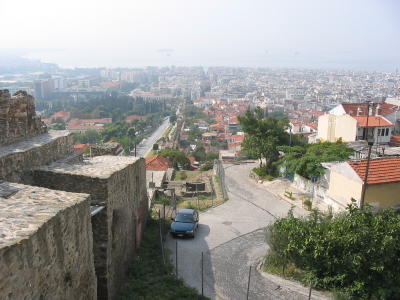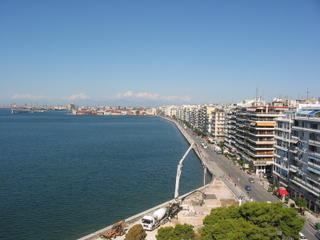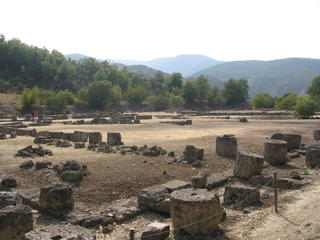This weekend I decided to go along on a field trip to Meteora and Ioannina with some study abroad students. I admit that I was a little hesitant about this, since I usually prefer not to travel in a huge group of Americans. However, it all turned out really well. The whole thing was organized by two professors (one a Grinnell alum!) who knew their way around, which meant that I got lost a lot less than I usually do in new places, and I also got to see a lot more, since it's convenient to have a bus always waiting to shepherd you around.
Meteora is apparently the "second most important group of monasteries in Greece." I don't know why I put that phrase in quotes, since I'm not strictly quoting anything, but it is something that I've read in various places. The first most important group of monasteries in Greece is Mount Athos, where I am not allowed due to my lack of a y-chromosome. That's right- only men are allowed on Athos. In fact,
female farm animals are not even allowed on Athos.
However, women are allowed to visit monasteries at Meteora, which is good, because at least one of the monasteries is actually a monastery for women. (I don't really know the difference between a monastery for women, a nunnery and a convent. I also don't know the difference between female monks and nuns. Maybe there is no difference.) All of the monasteries at Meteora are built way high up on big cliffs. The entire area is full of these huge rocks that are jutting out of the ground. Many of them are full of these strange looking holes. Apparently, the whole area was underwater many years ago, and somehow the water helped create all of this. I don't really understand it, but it is awesome. (Awesome in the
real sense of the word, not in the "if you could pass the ketchup, that would be awesome" sense.) Here are some pictures, and they will show you exactly what I mean:




See?
Awesome. We actually visited two of these monasteries (There used to be 21 of them, but now there are only six still in operation.) The first was the monastery of St. Stephan, and it's the aforementioned women's monastery. The church inside, of which I did not take pictures (I did not want to make any nuns mad at me) was painted in absolutely beautiful, vivid, detailed frescoes. Of course, some of them were pictures of people being thrown into hell and eaten by dragons, or demons coming to drag people away, or various holy people having various unpleasant experiences. However, they were some of the most beautiful paintings of hellish demons and painful death scenes that I have ever seen.
I should also mention the dress code. Visitors to the monastery are required to dress modestly; ie, no tanks tops, no shorts, and skirts below the knee for all women. Since most women tourists don't arrive in long skirts these days, the monastery provides them for everyone, so you get to walk around looking very fashionable, like this:

Here's something interesting about monastic life; it follows a completely different daily schedule than the usual one. The monks (regardless of gender) go to bed when the sun goes down, get up at 2am to pray for eight hours, eat their main meal of the day, work for eight hours, and then go to bed. It doesn't sound like a whole lot of fun to me, but I guess fun isn't really the point. I'll admit that I spent some time puzzling over the fact that I knew I had read something about monks getting up at 2am, and I couldn't for the life of me remember
where. Finally, I realized it was this passage from "The Dead":
"He was astonished to hear that the monks never spoke, got up at two in the morning and slept in their coffins. He asked what they did it for...The coffin, said Mary Jane, is to remind them of their last end.”
Well, James Joyce was right about one thing; monks do get up at 2am. I'm pretty sure they speak, though, since they talked to us when we paid our admission fees. I don't know if they sleep in coffins; they didn't let me see their bedrooms. (Besides, there are a few differences between Irish Catholic monks and Greek orthodox monks). However, this picture, taken at the second monastery we visited, is definite proof that they try to be reminded of their "last end" on a daily basis. Look at this:

These are skulls of dead monks. Apparently, after three years of being buried, the dead monks are dug up, their bones cleaned with wine, and put on display to remind the current, living monks of their own mortality.
We also saw a sort of monk dining hall (is it called a refectory? I don't remember) filled with wooden tables and benches. Monk's food is very simple, but it is also rumored to be very good. However, all monks are required to eat in the short period of only ten or twenty minutes, while psalms are being read. This is to prevent them from enjoying their food too much, since food is an earthly pleasure, and should only be for the sustainment of life, not pleasure. To be perfectly honest, I have a hard time believing this. This is
Greece, after all. It takes most Greeks several hours to finish a cup of coffee. The enjoyment of food is practically the national pasttime. How could any Greek, even an exceptionally pious one, give that up for ten minute meals? I guess it all comes down to the fact that I won't be joining a monastery anytime soon.
However, there are those people for whom monastic life is, apparently, not difficult enough. These people have apparently been known to take up residence in the holes in the mountain rocks, to live a life of solitude. There are even some holes with remnants of wall paintings in them, because the inhabitant decided to decorate their home. However, these people appear to be a dying, if not entirely dead, breed, possibly because, well, to me it looks like it would be very easy to roll out of those little holes in one's sleep. Take a look:

Anyway, after we left the monasteries and removed our skirts, we got back on the bus and headed to Ioannina. The road from Meterora to Ioannina snakes through the mountains on tiny little roads that go perilously close to steep drop-offs. It is positively gorgeous, though you do feel like you are going to die through most of the trip. I spent all four hours with my nose plastered to the window, watching the mountains go by, colored yellow and orange from the fall foliage. I would have taken pictures, but if you've ever tried to take pictures from a bus window, you know it's pretty much a pointless endeavor. You can choose the perfect shot, but by the time you actually click the shutter the bus has invariably just driven by some power lines or a huge tree, and you get a blurred picture of these obstacles, with some extra glare from the reflection of the flash on the window. It's just maddening.
We arrived in Ioannina after about four hours, which included a stop at a truck stop, where everyone was sitting at little tablecloth-covered tables drinking wine and eating platefuls of food. (I'm telling you, the Greeks are
not ten minute meal people. You can't even buy canned soup in the supermarket. I can just image the horrified reaction that Kraft macaroni and cheese would elicit.)
Ioannina is a lovely little city on a big lake, which is unusual, since Greece doesn't have many lakes. The people of Ioannina take full advantage of their lake, however; they use it for frogs. Yup, frog legs are the specialty of Ioannina. About six of us decided to order a plate of them at dinner, probably mostly so that we could take pictures and put them on our blogs. Here's what frog legs look like:

And, in case you were wondering, they really do taste kind of like chicken. They look like frogs, but they taste like chicken. I think that next time I am craving something that tastes like chicken, I will choose something that does not look like frog. But hey, I guess that if you're really freaked out about bird flu, frog could be one alternative. Or maybe if you're a monk and don't want to enjoy your food, you could just order food that looks like frogs.
Here I must pause to drift off on a tangent about culture differences. Since arriving in this country, Brad and I have spent most of our time with Greeks and Americans who are already quite integrated into the Greek way of life. So it was somewhat amusing to find myself thrust back into a group of Americans who are more, well,
American. Most notably, I find that meals suddenly became very different affairs. First off, though America college students are generally quite fond of alcohol, they choose to go drinking
after dinner, and drink vodka, rum, or tequila in outrageously priced cockails. (I cannot bring myself to pay seven Euros for drink. I just can't do it.) However, when they sit down to a meal, they don't drink at all. This is completely opposite to the Greek way of life: Greeks will never sit down to a full meal without some form of alcohol; retsina, wine, ouzo, and tsipouro all tend to appear on the table at a taverna with the same regularity as salt and pepper. However, Greeks also tend to stop drinking before they become belligerent or start to vomit, possibly because legal alcohol doesn't have the same quality of novelty to someone who's been able to drink legally since birth. I can't help but feel that the US has kind of screwed up when it comes to dealing with alcohol issues.
The next morning we all took a trip to the castle inside Ioannina, where they have several museums and a beautiful view of the mountains.

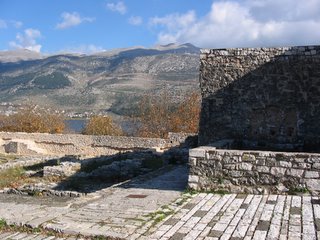
A Turkish leader named Ali Pasha lived in Ioannina some several hundred years ago, and he is buried within the walls of the castle, in something that looks vaguely like an ornate bird cage. Apparently, his mistress was drowned in the lake sometime in the early nineteenth century. I'm going to have to do a little bit more research on that, since I'm once again not clear on the details.
And, finally, we stopped at a cave on the way back, where we were treated to a long tour and some beautiful views of stalactites and stalagmites. I'll let you see this for yourself, and now I'm going to go plan our Thanksgiving celebration.
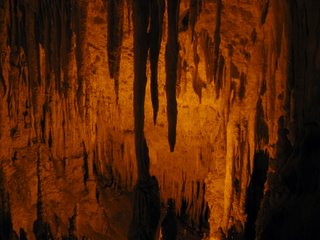
 I bought this stuff at the market, where, much to my amusement, it happened to be labeled "Greek Delight." I guess that's fair enough- the Turks conquered Greece for all of those years, and in exchange, the Greeks tried to conquer Turkish candy.
I bought this stuff at the market, where, much to my amusement, it happened to be labeled "Greek Delight." I guess that's fair enough- the Turks conquered Greece for all of those years, and in exchange, the Greeks tried to conquer Turkish candy.

























